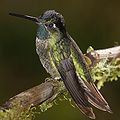Lampornithini
| Lampornithini | |
|---|---|

| |
| Purple-throated mountaingem (Lampornis calolaemus) | |
| Scientific classification | |
| Kingdom: | Animalia |
| Phylum: | Chordata |
| Class: | Aves |
| Order: | Apodiformes |
| Family: | Trochilidae |
| Subfamily: | Trochilinae |
| Tribe: | Lampornithini Jardine, 1833 |
| Genera | |
|
7, see text | |
Lampornithini is one of the three tribes that make up the subfamily Trochilinae in the hummingbird family Trochilidae. The other two tribes in the subfamily are Mellisugini (bees) and Trochilini (emeralds).
The informal name "mountain gems" has been proposed for this group. The largest genus Lampornis contains eight species with "mountaingem" in their common name.[1] The tribe contains 18 species divided into 7 genera.[2][3]
Phylogeny[]
A molecular phylogenetic study of the hummingbirds published in 2007 found that the family was composed of nine major clades.[4] When Edward Dickinson and James Van Remsen Jr. updated the Howard and Moore Complete Checklist of the Birds of the World for the 4th edition in 2013 they based their classification on these results and placed three of the nine clades in the subfamily Trochilinae. The clades were placed in separate tribes which were named Lampornithini (mountain gems), Mellisugini (bees), and Trochilini (emeralds).[5] The tribe Lampornithini with the current circumscription was introduced in 2009.[6] A subfamily based on the genus Lampornis was introduced by William Jardine in 1833.[7] The name Lampornithinae was used by Charles Bonaparte in 1842.[8]
| ||||||||||||||||||||||||||||||
| Phylogeny based on a molecular phylogenetic study published in 2014. The genera Sternoclyta and Hylonympha were not sampled.[2] |
| Trochilidae |
| ||||||||||||||||||||||||||||||||||||||||||||||||
The above cladogram of the hummingbird family is based on molecular phylogenetic studies by Jimmy McGuire and collaborators published between 2007 and 2014.[2][4][6] The English names are those introduced in 1997.[1] The Latin names are those proposed by Dickinson and Remsen in 2013.[9]
Taxonomic list[]
The tribe contains 7 genera.[3]
| Image | Genus | Living species |
|---|---|---|
 |
Sternoclyta |
|
 |
Hylonympha |
|
 |
Eugenes |
|
 |
Panterpe |
|
 |
Heliomaster |
|
 |
Lampornis |
|
 |
Lamprolaima |
|
References[]
- ^ a b Bleiweiss, R.; Kirsch, J.A.; Matheus, J.C. (1997). "DNA hybridization evidence for the principal lineages of hummingbirds (Aves:Trochilidae)". Molecular Biology and Evolution. 14 (3): 325–343. doi:10.1093/oxfordjournals.molbev.a025767.
- ^ a b c McGuire, J.; Witt, C.; Remsen, J.V.; Corl, A.; Rabosky, D.; Altshuler, D.; Dudley, R. (2014). "Molecular phylogenetics and the diversification of hummingbirds". Current Biology. 24 (8): 910–916. doi:10.1016/j.cub.2014.03.016.
- ^ a b Gill, Frank; Donsker, David; Rasmussen, Pamela, eds. (July 2020). "Hummingbirds". IOC World Bird List Version 10.2. International Ornithologists' Union. Retrieved 10 January 2020.
- ^ a b McGuire, J.A.; Witt, C.C.; Altshuler, D.L.; Remsen, J.V. (2007). "Phylogenetic systematics and biogeography of hummingbirds: Bayesian and maximum likelihood analyses of partitioned data and selection of an appropriate partitioning strategy". Systematic Biology. 56 (5): 837–856. doi:10.1080/10635150701656360.
- ^ Dickinson & Remsen 2013, p. 131.
- ^ a b McGuire, J.A.; Witt, C.C.; Remsen, J.V.; Dudley, R.; Altshuler, D.L. (2009). "A higher-level taxonomy for hummingbirds". Journal of Ornithology. 150 (1): 155–165. doi:10.1007/s10336-008-0330-x.
- ^ Jardine, William (1833). Humming Birds, Part II. The Naturalist's Library, Ornithology, Volume VII. London: Henry G. Bohn. p. 180.
- ^ Bonaparte, Charles Lucian (1842). Catalogo Metodico Degli Uccelli Europei (in Latin). Leiden: :J. Marsigli. p. 90.
- ^ Dickinson & Remsen 2013, pp. 105–136.
Sources[]
- Dickinson, E.C.; Remsen, J.V. Jr., eds. (2013). The Howard & Moore Complete Checklist of the Birds of the World. Volume 1: Non-passerines (4th ed.). Eastbourne, UK: Aves Press. ISBN 978-0-9568611-0-8.
|volume=has extra text (help)
- Lampornithini
- Hummingbirds
- Bird tribes